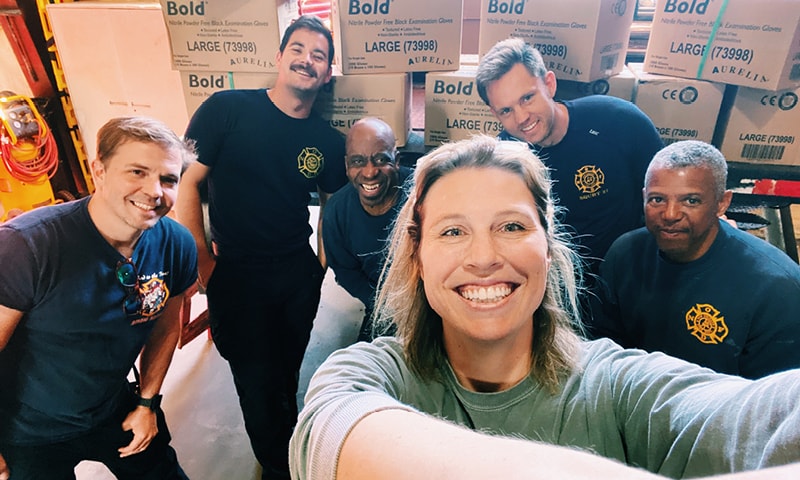Since January 2021, the LSU Healthcare Network, in partnership with the LSU Health Sciences Center in New Orleans, has been vaccinating faculty, staff, students and the public against COVID-19. Clinic operations, and the LSU Health New Orleans School of Nursing’s involvement in these once-booming clinics, continue. But over the last several months, there has been a significant decrease in interest when it comes to the vaccine.
“The decision to become vaccinated is influenced by multiple factors, such as perception of risk regarding the disease, vaccine safety, potential side effects, effectiveness, necessity, socioeconomic factors and complacency,” says Clair Millet, DNP, APRN, PHCNS-BC, Director of Faculty Development, CNE, and Entrepreneurial Enterprise and Assistant Professor of Clinical Nursing. She also cites distrust that stems from health illiteracy, lack of confidence in the health care system, prior experiences with vaccination and the political climate; personal preference influenced by beliefs, religion and culture; and accessibility and geographic location.
Combating Vaccine Hesitancy
What’s being done within the School of Nursing to combat vaccine hesitancy and permit continued progress in controlling the pandemic?
“Vaccine hesitancy is addressed on a case-by-case basis. Education and the dispelling of vaccine myths have been most effective,” Dr. Millet says. “One-on-one personal conversations have been very successful as well. We’ve learned many lessons from our COVID-19 efforts to help us communicate with our community members more effectively, especially in addressing concerns related to the vaccine’s fast track from discovery to administration.”
Additionally, Dr. Millet and Sherry Rivera, DNP, APRN, ANP-C, Assistant Professor of Clinical Nursing, submitted a grant proposal at the end of August 2021 to the Association of American Colleges of Nursing (AACN), in partnership with the Centers for Disease Control and Prevention (CDC), for the “Build COVID-19 Vaccine Confidence Among Nurses and in Communities” project, which has a particular emphasis on underrepresented, vulnerable and at-risk populations.
“Nurses are the most trusted profession. We absolutely have an important role to ensure that all parents’ questions and concerns are addressed.”
Sherry Rivera, DNP, APRN, ANP-C
Dr. Millet and Dr. Rivera are providing nursing professional development activities designed to build confidence among nurses to address vaccine hesitancy in their patients and communities.
Dr. Millet says Leslie Capo, Director of Information Services at the LSU Health Sciences Center, has done a great job at getting COVID-19 vaccination clinic information disseminated to the LSUHSC community, as well as via social media. Incentive programs, such as Louisiana’s Shot For 100 vaccine campaign, have been implemented at LSUHSC to address vaccine hesitancy.
In October, Louisiana’s Shot For 100 vaccine incentive program expanded beyond college students to include anyone in the state receiving their first COVID vaccine. Participants received a deactivated Visa gift card upon vaccination. After registering online at ShotFor100.com, a vaccine recipient’s card would be loaded with $100. This limited-time campaign continues until either the school exhausts its current supply of cards or the program is canceled by the governor’s office and/or the Louisiana Department of Health.
“There was a decline in the number of vaccines administered, as many have experienced, though the delta variant surge did seem to prompt a slight temporary increase in the number of vaccines administered,” Dr. Rivera says. “Louisiana’s Shot For 100 prompted some increased interest and, once the booster dose was approved, we began to see an increase in interest again.”
Always Ready for the Next Challenge
Dr. Rivera says that when the numbers of people interested in receiving the vaccine declined, the School of Nursing continued to be involved, but from a distance.
“We closely monitored the situation and, as the discussion about booster injections increased, we began preparations to assist in administering vaccines again on a larger scale,” she says. “We have been involved and will continue to be as eligibility expands. Our initial vaccine distribution experience has definitely prepared us to rapidly increase or decrease staffing in response to the need, and many faculty members have expressed their willingness to assist in this effort.”
Approval of a COVID-19 vaccine for younger children seems to be on the horizon, and nurses at the School of Nursing and elsewhere will likely play a key role in their acceptance and administration.
“Nurses have a very important role in encouraging parents to get these vaccines for their children when they become eligible and making sure children have access,” Dr. Millet says. “Nurses can conduct educational campaigns for parents and advocate for the vaccination of children, as well as administer the vaccine.”
“Nurses are the most trusted profession. We absolutely have an important role to ensure that all parents’ questions and concerns are addressed,” Dr. Rivera adds.
In collaboration with the LSU New Orleans Healthcare Network, the School of Nursing held its annual Flu Fair in early October, administering close to the same number of vaccines as prior years.
The 2021 Flu Fair was conducted under COVID-19 vaccination site operating procedures, and both the flu shot and COVID-19 vaccine were available to all eligible LSUHSC community members.
“Flu vaccinations are especially important this year because of the COVID-19 pandemic,” Dr. Millet says. “The flu vaccine reduces your risk of the flu and helps to conserve health care resources. Contracting the flu and COVID-19 at the same time could be even more dangerous than having either of these illnesses alone. To avoid both, people should remain diligent in personal safety precautions and social distancing efforts.”







